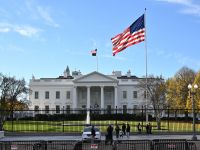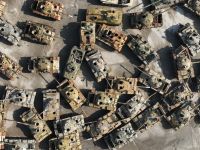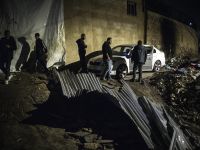British Defense Secretary Geoff Hoon Monday announced a further 26,000 troops are being sent to the Gulf for possible operations in Iraq.
The deployment will involve around one quarter of the British Army and will be on top of the 4,000 commandos already earmarked for the region. The troops' equipment will include 120 Challenger 2 tanks and 150 Warrior armoured personnel carriers, Hoon told Members of Parliament.
He said the deployment, which will take place over the coming weeks, would provide "the right group of forces for the sort of tasks that may be necessary." Additional reservists will also be called out in the coming weeks to support these troops, he conveyed.
The British official admitted deployment on such a scale was "no ordinary measure". But he insisted: "None of the steps we are taking represents a commitment of British forces to military action. A decision to employ force has not been taken, nor is such a decision imminent or inevitable."
Iraq, U.N.
The chief U.N. arms inspectors on Monday reported progress in two days of talks in Baghdad. Hans Blix and Mohammed ElBaradei said agreement was reached on practical issues, such as facilitating interviews with knowledgeable Iraqi scientists, but more time will be needed to get answers to key questions about old Iraqi chemical and biological weapons.
A 10-point joint statement said Iraqi officials had agreed to encourage weapons specialists to submit to private interviews with U.N. inspectors.
According to AP, Iraqi officials also told the U.N. representatives they would mount a comprehensive search for old chemical warheads for rockets, like the 16 empty munitions that have been reported found in recent days.
Blix and ElBaradei said the Iraqis had agreed to respond to questions regarding their 12,000 page declaration submitted Dec. 8 reporting on Iraq's chemical biological and nuclear program.
Amir al-Saadi, science adviser to President Saddam Hussein described the discussions as "very constructive and positive."
Blix noted that substantive issues still need to be resolved including questions about the disposition of old Iraqi chemical and biological weapons, such as VX nerve agent and anthrax.
But, speaking of the agreement on practical matters, he said, "We have come a long way" toward what he called an "effective, credible disarmament process." "Today was just not the time for substantive issues," he added.
Outlining the points of agreement, al-Saadi said the Iraqi government agreed to enact laws on "proscribed materials," meaning weapons of mass destruction.
"Persons asked for interviews in private will be encouraged to accept," al-Saadi said. He said Iraq was also prepared to answer questions arising from its weapons declaration.
In addition to encouraging scientists to speak with inspectors in private, al-Saadi said the list of people involved in weapons research programs "will be supplemented in accordance with advice" from the United Nations and the International Atomic Energy Agency.
"Iraq expressed readiness to respond to questions raised" in connection with its weapons declaration. (Albawaba.com)
© 2003 Al Bawaba (www.albawaba.com)







